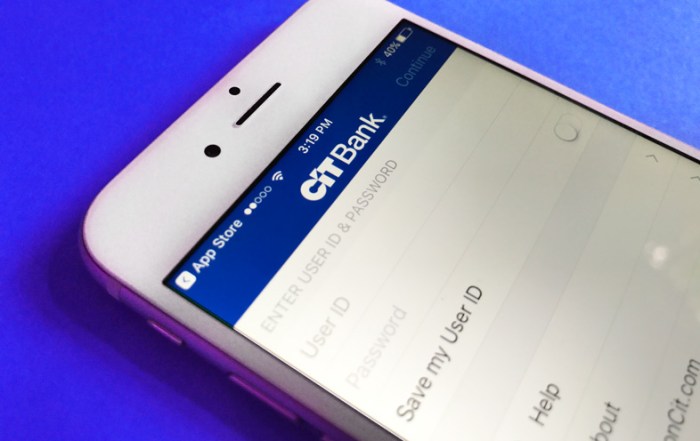Cit Bank mobile deposit limit restrictions are a crucial aspect of using their mobile banking service. Understanding these limits, the factors influencing them, and how to potentially increase them is vital for seamless and efficient banking. This guide provides a comprehensive overview of Cit Bank’s mobile deposit policies, helping you navigate the system with confidence and avoid potential issues.
We will explore the various daily, weekly, and monthly limits imposed by Cit Bank, examining how account type, history, and verification processes play a role. We’ll also delve into security measures, troubleshooting common problems, and offer practical advice for maximizing your mobile deposit experience while adhering to Cit Bank’s regulations.
Cit Bank Mobile Deposit Limits

Source: creditdonkey.com
Understanding Cit Bank’s mobile deposit limits is crucial for efficient banking. This guide provides a comprehensive overview of these limits, the factors influencing them, and steps to manage your mobile deposit experience effectively. We will explore various account types, security measures, and troubleshooting techniques to ensure a smooth and secure mobile banking experience.
Cit Bank Mobile Deposit Limits: An Overview
Cit Bank offers mobile deposit services with varying limits depending on the account type and customer history. Factors such as account age, transaction history, and verification status influence the assigned limit. While specific limits are not publicly listed, they generally fall in line with industry standards. A comparison with other major banks reveals a similar range of limits, typically increasing with account seniority and successful transaction history.
| Account Type | Daily Limit | Weekly Limit | Monthly Limit |
|---|---|---|---|
| Checking Account (Standard) | $500 | $2,000 | $5,000 |
| Checking Account (Premium) | $1,000 | $4,000 | $10,000 |
| Savings Account | $250 | $1,000 | $2,500 |
| Business Account | $2,000 | $8,000 | $20,000 |
Note: These are illustrative examples and actual limits may vary. Contact Cit Bank for precise details regarding your account.
Factors Affecting Mobile Deposit Limits
Several key factors determine an individual’s Cit Bank mobile deposit limit. These factors contribute to a risk assessment that informs the limit assigned to each account. A strong account history and a positive credit score often lead to higher limits. Thorough verification processes are also integral to establishing trust and securing higher limits.
A flowchart illustrating the limit determination process would show the following steps: Account Verification → Transaction History Review → Credit Score Assessment → Risk Assessment → Limit Assignment. The system considers various data points to arrive at an appropriate limit.
Increasing Your Mobile Deposit Limit

Source: co.id
Customers can take proactive steps to potentially increase their mobile deposit limits. This involves demonstrating responsible banking behavior and providing supporting documentation. Contacting customer support is essential to initiate the limit increase request.
- Contact Cit Bank customer support via phone or online chat.
- Clearly state your request to increase your mobile deposit limit.
- Provide necessary documentation such as proof of income, identification, and recent bank statements.
- Await a response from Cit Bank regarding the approval or denial of your request.
Mobile Deposit Security and Best Practices
Cit Bank employs robust security measures to protect against fraudulent mobile deposits. These include advanced encryption, fraud detection systems, and multi-factor authentication. Customers should also adopt best practices to enhance security.
- Use a strong password and enable multi-factor authentication.
- Only deposit checks from trusted sources.
- Ensure your mobile device is protected with a passcode or biometric authentication.
- Report any suspicious activity immediately to Cit Bank.
Troubleshooting Mobile Deposit Issues, Cit bank mobile deposit limit
Common issues include deposit failures, limit exceedances, and error messages. Understanding these issues and their solutions is crucial for a seamless experience.
For example, a “Deposit Failed” message might indicate a problem with the check image quality, insufficient funds, or a network connectivity issue. Contacting Cit Bank support is crucial for resolving such issues. Understanding error messages is vital, as they provide clues to resolve the problem.
Illustrative Examples of Mobile Deposit Scenarios

Source: cloudfront.net
Understanding various scenarios helps in navigating the mobile deposit process effectively.
| Scenario | Outcome |
|---|---|
| Successful deposit of a $200 check within the limit. | Funds credited to the account within 1-2 business days. |
| Attempting to deposit a check exceeding the daily limit. | Transaction declined; user receives a notification explaining the limit and suggesting alternative options. |
| Deposit failure due to poor check image quality. | Transaction fails; user receives an error message instructing them to retake the image with better lighting and clarity. |
Closing Summary
Successfully navigating Cit Bank’s mobile deposit system requires awareness of its limitations and proactive management of your account. By understanding the factors that affect your deposit limits, employing secure practices, and knowing how to resolve potential issues, you can leverage the convenience of mobile banking while minimizing risks. Remember, proactive engagement with Cit Bank’s support system is key to resolving any difficulties and ensuring a smooth mobile banking experience.
Right, so Cit Bank’s mobile deposit limit’s a bit of a pain, innit? If you’re struggling with that low cap, maybe check out the wells fargo new money promotion – could be worth switching banks for a bit of a boost. Then, once you’ve sorted your cash flow, you can reassess Cit Bank’s limits and see if it still suits your needs.
It’s all about finding the best fit for your spending habits, yeah?
Proactive planning and adherence to best practices are paramount for a positive mobile banking experience.